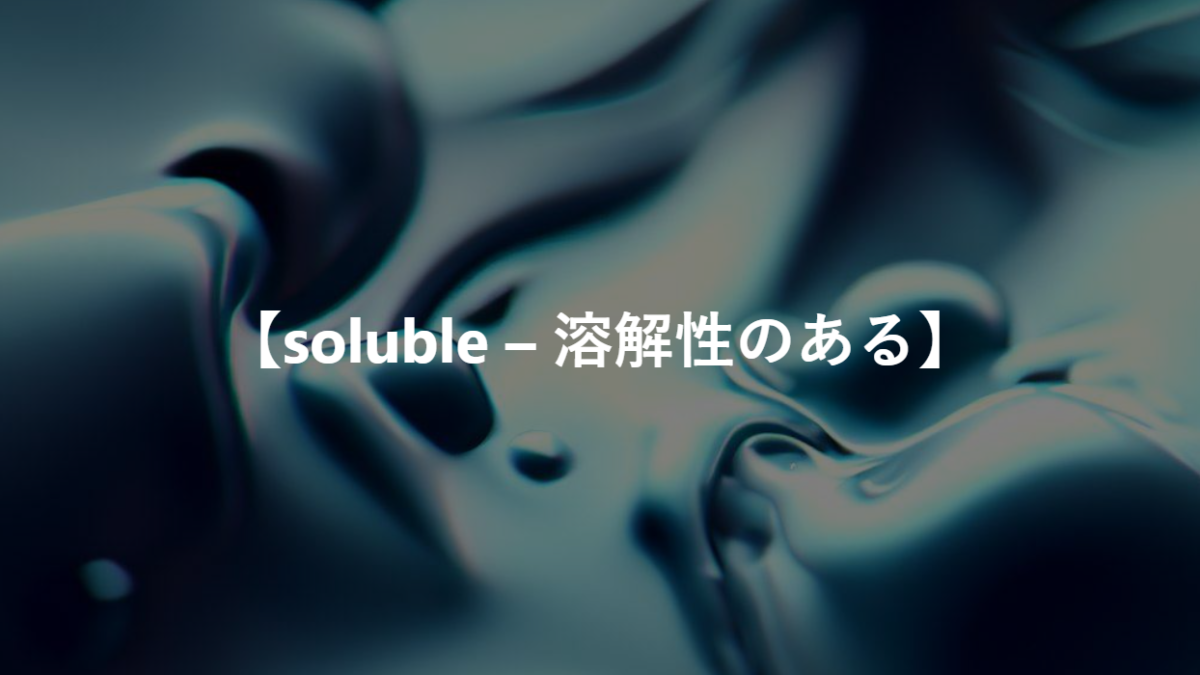語源・類義語・反対語・例文
【soluble – 溶解性のある】という単語の語源とか由来を知っていますか?
「soluble」は、ラテン語の「solubilis」から来ており、「溶けることができる」または「解ける」という意味です。これは、「solvere」(解く、解放する)という動詞から派生しています。したがって、「soluble」の原義は、何かが液体に溶解したり、液体に溶けたりする能力を指します。
時間が経つにつれ、「soluble」は主に化学的な文脈で使用されるようになり、ある物質(特に固体)が他の物質(通常は液体)に溶ける性質や能力を指すようになりました。この言葉は今日、溶解性のある物質を説明するのに一般的に使われています。
Yes, I can explain the etymology of the word “soluble.”
The term “soluble” originates from the Latin “solubilis,” which means “able to be loosened or dissolved.” This is derived from the verb “solvere,” meaning “to loosen, to release.” Therefore, the original sense of “soluble” refers to the ability of something to dissolve into a liquid or to become dissolved.
Over time, “soluble” has primarily come to be used in a chemical context, denoting the property or ability of a substance (especially a solid) to dissolve in another substance (usually a liquid). Today, this word is commonly used to describe substances that have the property of being soluble.
この単語の類義語・反対語を教えてください。
類義語:
- Dissolvable (溶解可能な): 液体に溶けることができる性質を持つ。
- Solvable (溶けることができる): 溶解することが可能。
- Dissoluble (溶解できる): 同じく溶けやすい、または分解しやすい。
- Solvent (溶剤): 主に化学において、他の物質を溶かす能力を持つ物質。
反対語:
- Insoluble (不溶性の): 液体に溶けない性質を持つ。
- Indissolvable (不溶解性の): 溶解できない、または溶けない性質を持つ。
- Undissolvable (溶けない): 溶解することができない、または分解しない。
- Non-dissolvable (非溶解性の): 溶けることがない、溶解しない性質を指す。
この単語に似た単語で間違いやすい単語はありますか?
- Soluble vs. Solvable: 「soluble」は「溶解性のある」という意味ですが、「solvable」は「解決可能な」という意味です。前者は化学的な性質を指し、後者は問題や方程式などが解決できるかどうかを指します。
- Soluble vs. Insoluble: これらは反意語です。「soluble」は物質が液体に溶けることを意味し、「insoluble」は溶けないことを意味します。形容詞の接頭辞が異なるため、混同しやすいです。
- Soluble vs. Solvency: 「soluble」は「溶解性のある」を意味するのに対し、「solvency」は財務用語で、企業や個人が負債を支払う能力を指します。これらの単語は音響が似ていますが、全く異なる概念を表しています。
- Soluble vs. Solution: 「soluble」は物質が溶ける性質を表すのに対し、「solution」は溶液、つまり物質が溶解して形成された液体を指します。関連性はありますが、意味は異なります。
この単語を使った例文を5つほど教えてください。
The tablet is soluble in water, so it can be easily consumed.
(その錠剤は水に溶けるので、簡単に摂取できます。)
The doctor prescribed a soluble powder that should be dissolved in warm water.
(医師は温かい水に溶かす必要のある溶解性のある粉を処方しました。)
Calcium is a mineral that is soluble in acidic environments.
(カルシウムは酸性の環境で溶解性のあるミネラルです。)
The ink used in the printer is soluble in organic solvents.
(プリンターで使用されるインクは有機溶媒に溶解性があります。)
This compound is highly soluble in alcohol but has low solubility in water.
(この化合物はアルコールには高い溶解性を持ちますが、水に対しては溶解性が低いです。)
【soluble – 溶解性のある】のコロケーション
- Soluble in water: 「水に溶ける」。これは最も一般的なコロケーションの一つで、特定の物質が水に溶解する能力を示します。多くの場合、塩や砂糖など、日常生活で見かける物質が対象となります。
- Soluble fiber: 「水溶性繊維」。食品や栄養の文脈で使用され、水に溶けてゲル状になるタイプの食物繊維を指します。水溶性繊維は、消化系の健康に良い影響を与えるとされています。
- Soluble substance: 「溶解性物質」。これは、ある物質が特定の液体に溶ける性質を持っていることを示します。この表現は、化学実験や製品説明などでよく使用されます。
- Highly soluble: 「高い溶解性の」。物質が非常によく溶けることを表し、特に科学的な研究や製薬業界で使われます。これは、少量の溶媒で大量の物質が溶ける能力を指します。
- Soluble compounds: 「溶解性の化合物」。特定の化合物が、水や他の溶剤にどの程度溶けやすいかを指します。この用語は、化学や生物学の分野で頻繁に使われることがあります。
「soluble」という単語は、「溶解性のある」という意味を持ち、特に科学的な文脈でよく使われる表現です。これは、物質が他の物質、特に液体に溶ける能力に関連しています。ここでは、「soluble」と頻繁に組み合わせて使用される言葉の組み合わせ、すなわちコロケーションについて解説します。
まず、「Soluble in water」というフレーズは「水に溶ける」という意味で、塩や砂糖のように、水に容易に溶ける物質を指します。このコロケーションは、溶解性を示す際に最も一般的に使用される表現の一つです。
次に、「Soluble fiber」は「水溶性繊維」と訳され、食物繊維の一種で水に溶ける性質を持つものを指します。この種類の繊維は、消化系の健康に好影響を与えるとされており、食品や栄養学の分野でよく話題に上ります。
「Soluble substance」は「溶解性物質」という意味で、特定の溶剤、通常は水に溶ける物質全般を指す言葉です。化学実験や製品の説明などで使われることがあります。
また、「Highly soluble」という表現は「高い溶解性の」という意味で、非常に効率的に溶ける物質を示します。この表現は、化学研究や製薬において、溶解度が特に重要な役割を果たす場合に用いられます。
最後に、「Soluble compounds」というフレーズは「溶解性の化合物」と訳され、特定の化合物が溶剤にどの程度溶けるかを表します。これは主に化学や生物学の文脈で使用されるコロケーションです。
これらのコロケーションは、「soluble」がどのような状況や文脈で使用されるかを示し、特に溶解性の特性を持つ物質を説明する際に役立ちます。
The term “soluble” means “capable of being dissolved,” and is commonly used in scientific contexts. It relates to the ability of a substance to dissolve in another substance, particularly liquids. Here, we will discuss collocations, or combinations of words frequently used with “soluble.”
First, the phrase “Soluble in water” translates to “able to dissolve in water” and refers to substances like salt or sugar that easily dissolve in water. This collocation is one of the most commonly used expressions to demonstrate solubility.
Next, “Soluble fiber” translates to “water-soluble fiber,” a type of dietary fiber that has the property of dissolving in water. This kind of fiber is known to have beneficial effects on the digestive system and is often discussed in the context of food and nutrition.
“Soluble substance” means “a substance that dissolves,” referring to any substance that can dissolve in a solvent, usually water. This term is used in contexts such as chemical experiments or product descriptions.
Moreover, the expression “Highly soluble” means “having a high capacity to dissolve,” indicating substances that dissolve efficiently. This term is utilized particularly in chemical research or pharmaceuticals where solubility plays a crucial role.
Lastly, “Soluble compounds” refers to “compounds that can dissolve in a solvent.” This collocation is primarily used in the contexts of chemistry and biology.
These collocations illustrate how the word “soluble” is used in various situations and contexts, especially in describing substances with dissolvable properties.
文法問題: “soluble” (溶解性のある)
- 品詞と使い方:
Sugar is _ in water, meaning it dissolves easily.
(A) solubleness
(B) solubly
(C) soluble
(D) solubilize
解答と解説: (C) soluble
空欄には補語となる形容詞が必要です。soluble は「溶解性のある」という意味の形容詞です。
– - 名詞形:
The _ of the substance was tested by adding it to different solvents.
(A) soluble
(B) solubleness
(C) solubility
(D) solubilize
解答と解説: (C) solubility
空欄には主語となる名詞が必要です。solubility は「溶解性」という意味の名詞です。
– - 反意語:
Oil is _ in water, meaning it does not mix with it.
(A) soluble
(B) insoluble
(C) dissolvable
(D) soluble
解答と解説: (B) insoluble
文脈から、空欄には soluble の反意語が入ることがわかります。insoluble は「溶解しない」という意味なので、適切です。
– - 類義語:
The scientist tested the _ of the new compound in various liquids.
(A) solubility
(B) dissolvability
(C) miscibility
(D) all of the above
解答と解説: (D) all of the above
solubility, dissolvability, miscibility はいずれも「溶解性」という意味で、この文脈ではすべて適切です。
– - 誤文訂正:
The soluble fiber in fruits and vegetables is important for digestive health.
解答と解説: 誤りはありません。
この文は、「果物や野菜に含まれる水溶性繊維は、消化器系の健康に重要である」という意味で、soluble が正しく使われています。

